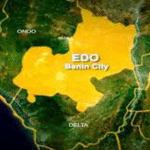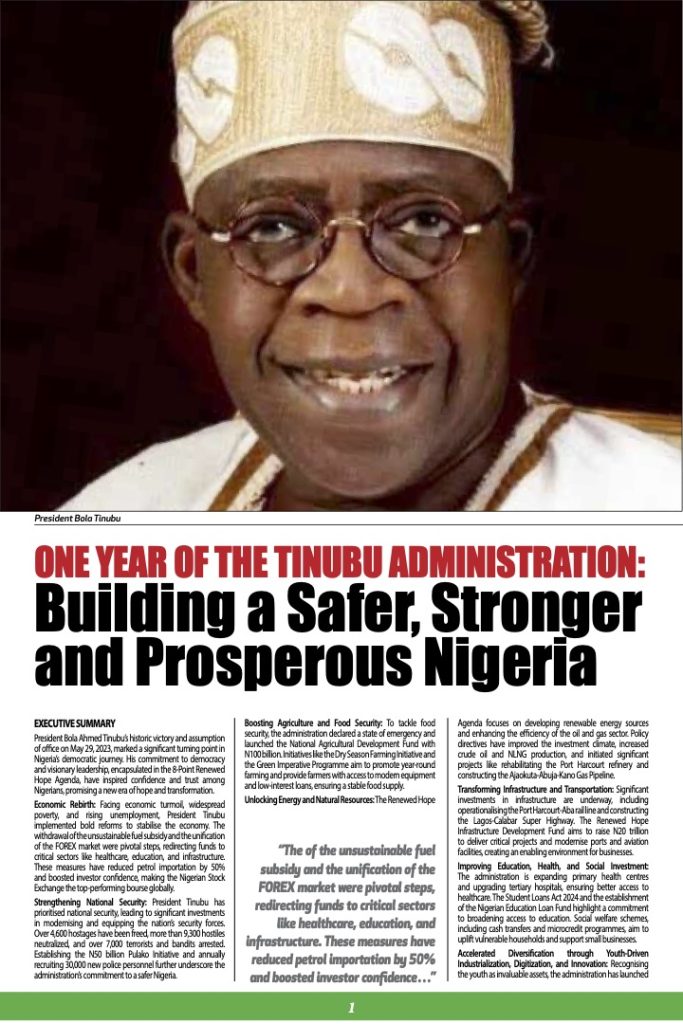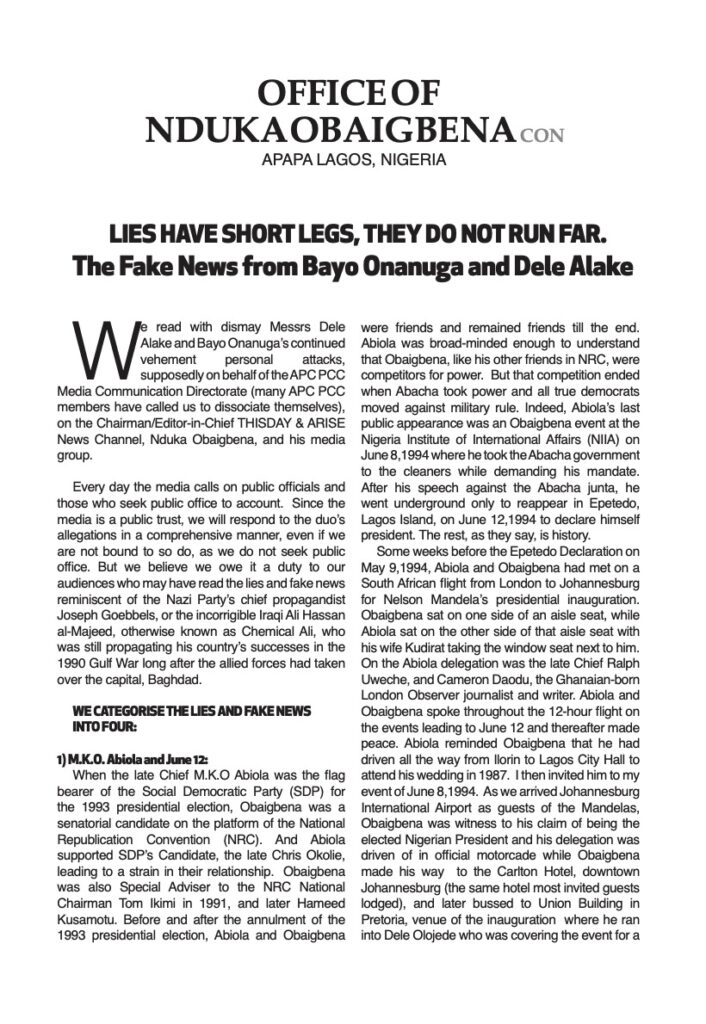Latest Headlines
Kano: An Emirate Being Diminished by In-fighting?

The Advocate By Onikepo Braithwaite Onikepo.braithwaite@thisdaylive.com
The Advocate
By Onikepo Braithwaite
Onikepo.braithwaite@thisdaylive.com
“There’s a trick to a Graceful Exit. It begins with the vision to recognise when a job, a life stage, a relationship is over – and to let go. It means leaving what’s over, without denying its value.” – Ellen Goodman
Before I go into the Word for Today, I must restate the fact that I am not acquainted with either the 15th Emir of Kano, Alhaji Aminu Ado Bayero, or the 14 & 16th Emir of Kano, HH, Muhammad Sanusi II. I do not support either party, I only support the rule of law.
Sanusi, Ado Bayero and the Federal High Court
Someone asked me why it was alright for Emir Muhammad Sanusi II to have gone to the Federal High Court (FHC) when he was deposed as Emir of Kano in 2020, and why the same FHC now lacks jurisdiction to hear the case in support of the 15th Emir of Kano, Alhaji Aminu Ado Bayero.
The answer is simple. The reason is because, in the case of the 14th & 16th Emir of Kano, Muhammad Sanusi II, he sought to enforce his fundamental rights, that is, his right to liberty and freedom of movement guaranteed by Sections 35(1) & 41(1) of 1999 Constitution of the Federal Republic of Nigeria (as amended in 2023)(the Constitution) since Governor Abdullahi Ganduje not only deposed him, but banished him to Nasarawa from Kano. See Section 3(a) of the Fundamental Rights (Enforcement Procedure) Rules 2009 (FRR). The enforcement of his constitutionally guaranteed fundamental rights, were his primary and only complaints. The FHC declared Emir Sanusi‘s banishment to be illegal and unconstitutional, ordered his release from illegal custody and awarded him N10 million. Emir Sanusi’s action, was not instituted to dispute his deposition from the position of Emir of Kano. In Gafar v Government of Kwara State & Ors (2007) LPELR-8073(SC) per Mahmud Mohammed, JSC, the Supreme Court held that “a condition precedent to the exercise of the court’s jurisdiction is that the enforcement of fundamental rights or the securing of the enforcement thereof, should be the main claim and not an accessory claim. That where the main or principal claim is not the enforcement of a fundamental right, the jurisdiction of the court cannot be properly exercised, as it will be incompetent”. I submit that in Emir Sanusi’s case, the enforcement of his constitutionally guaranteed fundamental rights was the main claim, and the jurisdiction of the FHC was thereby, ignited.
This isn’t quite the situation in Alhaji Aminu Ado Bayero’s case. In Suit No. FHC/KN/CS/190/2024 filed at FHC Kano (Amobeda J) in which the 15th Emir himself is the Plaintiff, that case is a mixture of enforcement of rights, but based upon the fact that Alhaji Ado Bayero asserts and believes that or holds himself out to be the Emir of Kano.
In the other case filed at the FHC by Alhaji Aminu Baba Dan Agundi (Sarkin Dawaki Babba) in support of Alhaji Ado Bayero, Suit No. FHC/KN/CS/182/2024, it is as clear as a bell that this case is one in which the main or principal claim was that which bordered on the challenge of the appointment of Muhammad Sanusi II as the 16th Emir of Kano and setting it aside; and setting aside the other steps taken pursuant to the Kano State Emirates Council (Repeal) Law 2024 (KRL) including the dissolution of the five Emirate Councils, the sack of Emir Ado Bayero and the appointment of Emir Sanusi. In short, the main plank of this case, is to set aside Emir Sanusi’s appointment and reinstate Alhaji Aminu Ado Bayero as Emir of Kano. The prayers of the Plaintiff and the orders of the FHC, are not only an affirmation of this fact, but is also a confirmation having seen the prayers in the matter, that the proper venue to ventilate these grievances is the Kano State High Court and not the FHC, as it is a pure Chieftaincy/Emirate/Kano State law matter. See Section 251(1) of the Constitution.
Furthermore, in Olaniyi v Aroyehun (1991) LPELR-2566 (SC) per Adolphus Godwin Karibi-Whyte, JSC, the Supreme Court held that Chieftaincy is not a matter of fundamental rights, and couldn’t be enforced under the provisions of the Constitution. The Apex Court further held that Chieftaincy is not a human right, but a privilege; that “it is not such a right which the law can enforce, by virtue merely of the Claimant being a human being”. The purport of this is that, the enforcement of a Chieftaincy/Emirate right, is not one of the fundamental rights contemplated by Chapter IV of the Constitution to be protected using the FRR. Therefore, in Gov of Kogi State & Ors v Yakubu & Anor (2001) LPELR-3177 (SC) per Uthman Mohammed, JSC, the Supreme Court held that where the primary complaint is deposition from chieftaincy and the alleged breaches of fundamental rights are mere accessories to the primary complaint, proceedings by way of the FRR are inappropriate.
Being a chieftaincy matter and not one included in the jurisdiction of the FHC in Section 251(1) of the Constitution, Kano State High Court (KHC) is the proper venue for the Bayero matter, even if it may have involved the enforcement of fundamental rights (which the aforementioned court processes of the Alhaji Agundi case did not show). In EFCC v Wolfgang Reinl (2020) LPELR-49387(SC) & Ihim v Maduagwu (2021) LPELR-53906, the Supreme Court held inter alia that, both the State and Federal High Court have concurrent jurisdiction in matters pertaining to fundamental rights. Therefore, the irresistible conclusion to arrive at is that, since the primary complaint, that is, the deposition of Emir Bayero falls within the purview of the jurisdiction of the KHC, any other ancillary claim for the enforcement of fundamental rights could also have been heard at the KHC. See Section 46(1) of the Constitution.
Liman J’s Shocking Orders: An Absolute Abuse of Court Process
It is therefore, shocking, not only that Counsel that filed this matter at the wrong venue, the FHC, is a learned Senior Advocate, but that Liman J of the FHC Kano went ahead to defiantly assume jurisdiction in the Bayero matter and issue orders, despite the fact that the FHC obviously lacks the jurisdiction to hear it (see the case of Madukolu v Nkemdilim 1962 2 SCNLR 34 about jurisdiction being the lifeblood of a case, without which a case is dead); also subsequent upon the Chief Judge of Kano State and her counterpart in the FHC, being summoned by the Chief Justice of Nigeria, Hon. Justice Olukayode Ariwoola, GCON, on account of the Kano State imbroglio.
This is obviously a case in which the LPDC and NJC, must rise up. We cannot continue to accommodate those who are destroying our profession, simply for their own personal gain. Nor can we allow politicians, particularly because they are in the ruling party, to have their way by hook or by crook. It is bringing our profession, into serious disrepute. It would be foolhardy, to continue on this downward spiral, as the consequences may be dire.
Anarchy?
What is really happening in our country, Nigeria? Where the arms of government in which the powers of the Federal Republic of Nigeria have been placed by Sections 4, 5 & 6 of the Constitution, misuse those powers with gusto and aplomb (relish too)? It is even more worrying when this abuse may be happening in the judicial/legal sector, where we are all meant to be officers in the temple of justice and experts in the law. See Gafar v Government of Kwara State & Ors (Supra). In AG Kano State v AGF (2007) LPELR-618 (SC) per Mahmud Mohammed, JSC, in which the Supreme Court held that “where a court had no jurisdiction to entertain any claim, anything done in respect of the claim will be an exercise in futility”. It is also trite law that that neither a court nor parties to an action, can confer jurisdiction on the court; it is the Constitution and statute only, that confer jurisdiction. See the case of Onwudiwe v FRN (2006) LPELR-2715(SC) per Niki Tobi, JSC.
I submit that the FHC’s purported nullification of Emir Sanusi’s appointment by virtue of the fact that the FHC order annulled and set aside every step taken by the Kano State Government in pursuance of the KRL, while holding that the validity of the KRL is not affected by the order, is not only confusing and contradictory, but appears to be null and void ab initio and an exercise in futility, since the court that issued the orders lacks the jurisdiction so to do. The precious time of the Court of Appeal and the Supreme Court will also be wasted, in re-pronouncing on already settled issues about lack of jurisdiction, and the consequence of nullity in the decisions arising therefrom.
Local Government Caretaker Committees
Similarly, some Governors are also doing as they please, running their States like Emperors, and paying no mind to the Constitution and the Oath of Office they took to abide by it. Section 7(1) of the Constitution guarantees the system of local government, by democratically elected local government Councils. Therefore, it is obvious, even to the non-discerning and non-Lawyers, that an appointed Caretaker Committee isn’t democratically elected. Nobody, but the Governor who appointed them, voted for them. At least, the people did not vote for the Caretaker Committee in an election, which is the requirement to be democratically elected.
The issue of Governors setting up Caretaker Committees to replace duly elected Local Government Officials, has been settled by the Apex Court in a plethora of authorities. In APC & Ors v Enugu State Independent Electoral Commission & Ors (2021) LPELR-55337(SC) per Kudirat Motonmori Olatokunbo Kekere-Ekun, JSC, the Supreme Court held inter alia that “…a Governor has a bounden duty to preserve, in all its ramifications, the existence of democratically elected Local Government Councils”. This duty of a Governor to ensure that the system of a democratically elected local government continues unhindered, was also earlier stated by Olabode Rhodes-Vivour, JSC in Eze & Ors v Governor of Abia State & Ors (2014) LPELR-23276(SC).
It is the duty of the State Government to conduct local government elections, as and when due. The appointment of Caretaker Committees by Governors who may fail to fulfil their constitutional duty in this regard, is unconstitutional. In APC & Ors v Enugu State Independent Electoral Commission & Ors (Supra) per John Inyang Okoro, JSC, the Supreme Court held inter alia that the Local Government Laws of Enugu State which allowed the Governor to appoint Caretaker or Transition Committees out of which Chairmen shall be appointed for an arbitrary period of time, is in violent conflict with Section 7(1) of the 1999 Constitution as amended and is therefore, null and void”. Also see Governor of Ekiti State & Ors v Olubunmo & Ors (2016) LPELR-48040(SC) per Chima Centus Nweze, JSC; Ajuwon & Ors v Governor of Oyo State & Ors (2021) LPELR-55339(SC) per Ibrahim Mohammed Musa Saulawa, JSC.
As to the extension of the tenure of a Local Government Chairman, again, in APC & Ors v Enugu State Independent Electoral Commission & Ors (Supra) per Kudirat Motonmori Olatokunbo Kekere-Ekun, JSC, the Supreme Court held thus: “Nigeria is a country governed by the rule of law. No tenure can be extended beyond the period stipulated at the whims and caprices of the Governor, without an amendment to the existing law”. The purport of this appears to be that, if there has to be a tenure extension of the Local Government Council, it must be done by virtue of amendment of the existing law, and not on the say-so of a Governor or any so-called doctrine of necessity which isn’t really a doctrine of necessity or caused by some force majeure, but, the failure, neglect or omission of a State Government to organise elections as and when due.
Conclusion
As some Lawyers and Judicial Officers alike go down the path to destroy our jurisprudence and profession for their own personal gain, and that of their cohorts, be it politicians, clients or whoever,
we call on those who are empowered to protect same, to stand firmly against them to restore our legal profession, both the Bar and Bench, because for one, as the CJN succinctly put it a few weeks ago, the Judiciary’s “reputation deserves more crystallisation and embellishment than what it is currently getting”. Ditto for Lawyers. Sadly, this will not happen, if we continue on this negative trajectory of abuse of court process, and the general lack of respect for the rule of law that has pervaded all arms of government, and perpetrators do not face any consequences for their actions. The Kano Emirate is an ancient and extremely respected one, which shouldn’t be dragged down by an unnecessary leadership tussle.

















